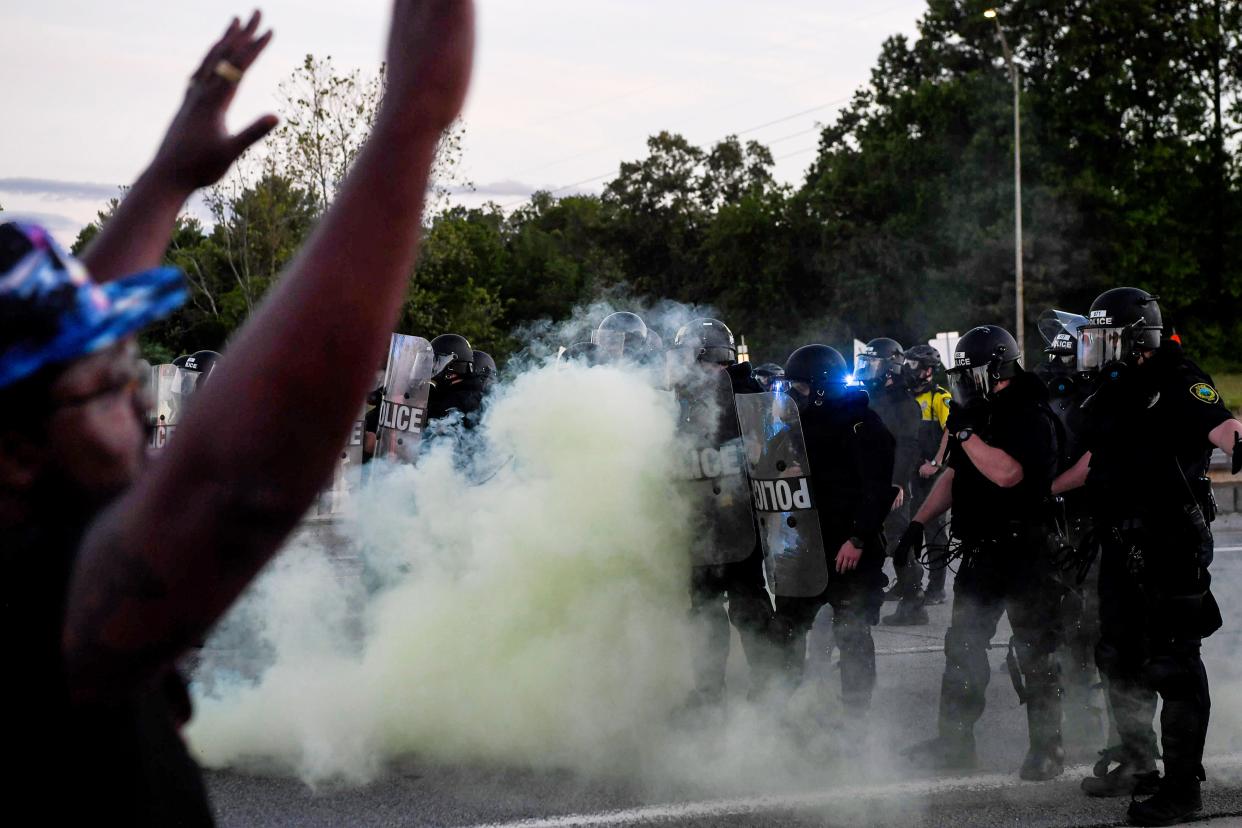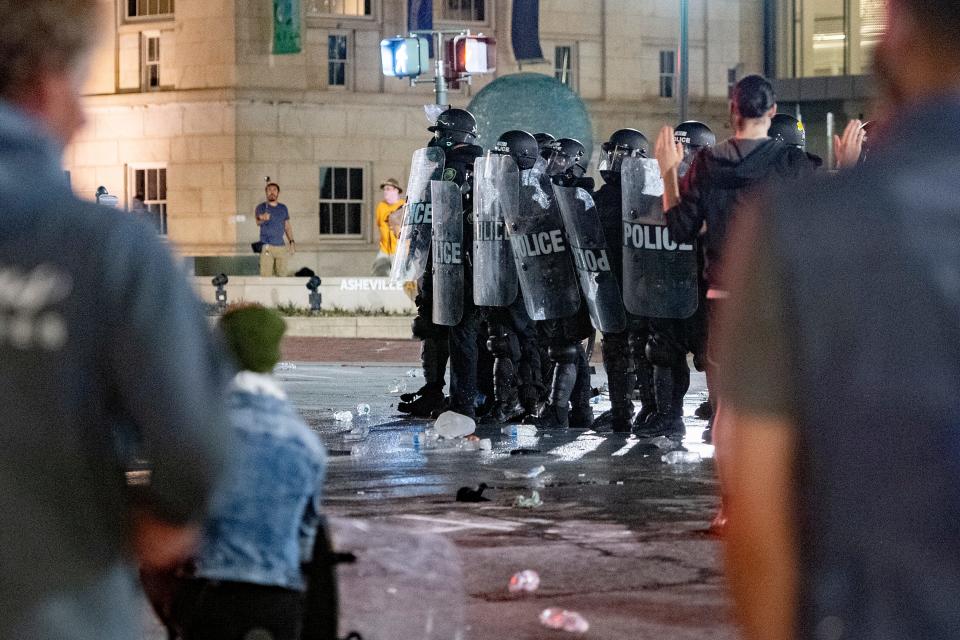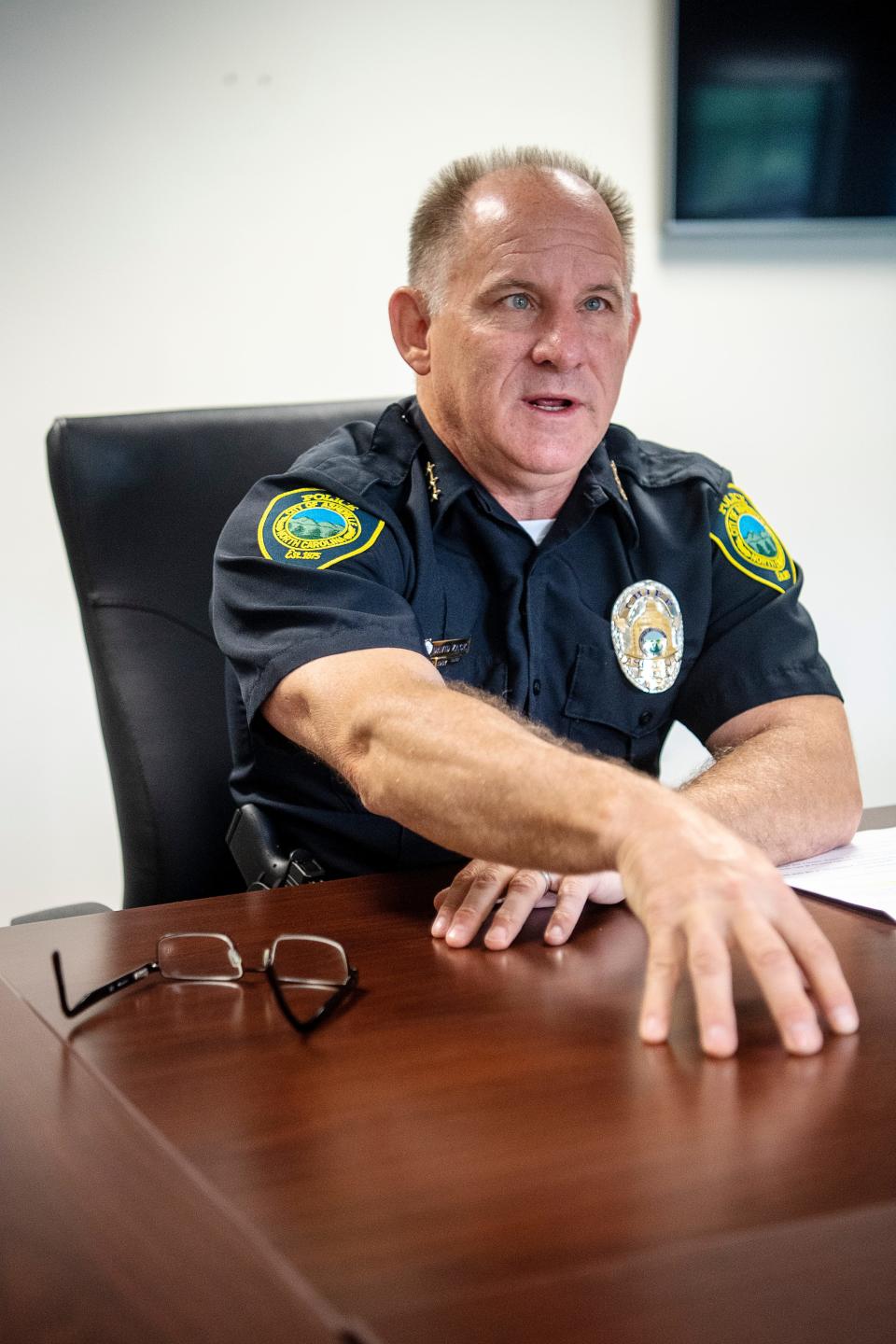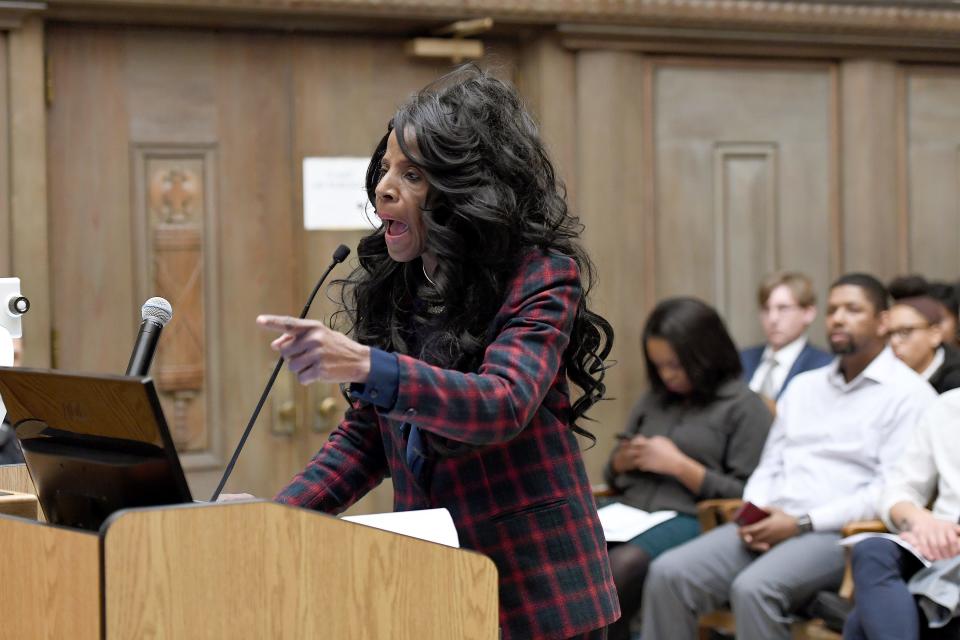Asheville police 'transparency advisers' push filler, social media clout: public records

ASHEVILLE - Facing criticism that it allegedly mishandled racial justice protests in the wake of George Floyd's 2020 murder, the Asheville Police Department leaned on a company promising transparency.
But public records obtained by the Citizen Times show that much of that firm's work has been standard public relations fare with an emphasis on social media popularity, a service criticized by some as a waste of resources.
Contracts with California-based Cole Pro Media and sister company Critical Incident Videos have cost Asheville taxpayers $125,900 since 2020, according to the city’s finance office. At a Nov. 17 meeting this year, the public safety committee — in a 2-1 vote — supported APD entering into a new three-year contract that would cost another $162,000. The department has already counted the funds in its budget.
If approved, the city will have spent enough to pay for six trainees' salaries ― listed as $45,856 ― for one year, with some funds left over.
The city first contracted with the out-of-state firm in November 2020, but began working with them in earnest that June, when local police came under scrutiny for their intentional destruction of a volunteer medic tent, water bottles and supplies, and for allegedly assaulting marchers, including children, with tear gas and rubber bullets.
Cole Pro Media's help came at a time when the department saw high turnover, with 59 officers leaving that year. Police are still struggling to retain and recruit officers, with understaffing reportedly hovering around 40% over the last few months.
From the protests:Police officer accused of blinding Asheville protester loses claims against city
More:'Senseless' and 'wrong': North Carolina mayor condemns police destruction of medics' tent
More:Asheville Police plan changes after 2020 police brutality protests. Are they enough?
APD:Spent nearly $2.5 million on overtime in just over 2 years
In a July 2020 slideshow presentation titled “Post-George Floyd,” the company recommended that APD push “filler” and “safe content” just a month after the racial justice protests.
Some examples include:
A picture of a sunflower that represents “peace and unity for all.”
A “#selfiesunday” picture of a patrol car.
A picture of a “majestic” hawk that appeared to be injured before it flew away unharmed.
“With police brutality at the center of the current narrative, posts like this show the softer side of cops,” the presentation said of another highlighted Facebook post.
At the Nov. 17 committee meeting, APD Financial Business Manager Elise Lewis said that a new contract with Cole Pro Media would help APD follow recommendations from 21CP Solutions, a company contracted by the city to give advice after an August 2017 incident in which now-fired Officer Christopher Hickman brutally beat Johnnie Rush, a Black man who was accused of jaywalking.
In line with 21CP Solutions’ recommendations, Cole Pro Media's help could “involve asserting control over media exposure, reducing liability and preserving public safety in the immediate aftermath” of a "critical incident," a document prepared by the department says.
A longtime police expert questioned the company's value.
“It’s just too commercialized,” said Maria Haberfeld, the chair of the Department of Law, Police Science and Criminal Justice Administration at John Jay College of Criminal Justice. Haberfeld also served in a counter-terrorist unit in the Israel Defense Forces, in the Israel National Police and as a special consultant for the U.S. Drug Enforcement Administration.
“Who’s going to be overseeing this, if the recommendations are in alignment with conduct becoming or conduct unbecoming of a police organization?” she said to the Citizen Times in an interview.
Meanwhile, as the city has paid for greater transparency, APD has not responded to public safety and accountability questions from the Citizen Times, Asheville’s only daily newspaper.

‘Transparency engagement advisers’
Former television news reporter Laura Cole Deason — who goes by Laura Cole — is the founder of both Cole Pro Media and Critical Incident Videos. On paper, Cole Pro Media gives feedback on news releases, offers day-to-day messaging advice, crafts long-term talking points and helps agencies plan social media posts. Critical Incident Videos creates short briefs for controversial incidents, including officer-involved shootings.
With Cole at the helm of both firms, the two companies’ work overlaps frequently. Asheville police were taking Cole Pro Media-style consulting advice from her when they only had a contract with Critical Incident Videos in June 2020, for example. The city signed its first Critical Incident Videos contract in April that year.
Her companies have branded themselves on encouraging openness. Cole Pro Media consultants are called "transparency engagement advisers." Cole has spoken about transparency to the highly reputed International Association of Chiefs of Police, and in media interviews she has presented herself as a helpful thorn in agencies’ sides, constantly pushing them to be open, sometimes against their wishes.
"At the end of the day, it’s not the department who pays me, it’s the taxpayers, so it’s my responsibility to take that seriously," she told Elle Magazine in 2020.
But outside police circles, her companies have earned a reputation for helping agencies dodge controversies and find their base. In an all-day class called “Managing The Mainstream Media: the STREET SMART class to outsmart reporters," she taught police “what to do when controversy strikes” and how to “make reporters work for you,” the Vallejo Sun and The Appeal reported in 2021. That class also taught police how to optimize social media and finally see some “good news.”
The Citizen Times requested an interview with Cole several times by phone and email in October and once more in November. She did not respond.
Zack met Cole at an IACP police conference event months before he came to Asheville, according to one email.
“Chief Zack became aware of Laura Cole and (Critical Incident Videos) at the IACP in Chicago in October of 2019,” APD Capt. Jackie Stepp wrote in a March 2020 email seeking city support for a Critical Incident Videos contract. “After speaking with Laura and seeing the work they do, he implemented critical incident videos at his former department in Cheektowaga, NY. Because of the value that he sees in these videos and the level of transparency that is provided to the community during critical incidents, he wishes to implement this practice at APD.”
Despite being contracted with the company for more than two years, with its current contract set to expire in 2023, APD does not appear to have released any critical incident videos. A formal records request by the Citizen Times for materials created by Critical Incident Videos and Cole Pro Media earlier this year yielded no videos.
But the department – with City Manager Debra Campbell and Mayor Esther Manheimer looped in – did put together at least one video with a script written by Cole shortly after the 2020 police protests, the emails show.
In the video, Zack promised that an “outside, independent investigator” would look into three things: police’s use of tear gas on protesters, “what happened at the Captain Jeff Bowen Bridge” and the destruction of supplies at the medic tent.

The city never published the video, which is still private but viewable on its YouTube page.
The city’s two reports on the 2020 protests are not independent. Asheville police wrote their own 303-page internal report after City Council decided that hiring an outsider would be too expensive, and City Attorney Brad Branham oversaw a shorter report that looked at city leaders’ handling of the protests.
In a June 15, 2020, email to then-APD spokesperson Christina Hallingse, Cole recommended that Zack reference the planned independent report when declining to answer questions about the protests from reporters and the public generally.
One way she recommended wording it: “I don’t want to speculate or taint the investigation which is why we must wait for the independent report.”
Cole Pro Media has also worked to help the department stay ahead of traditional media outlets on day-to-day stories – warning them about what questions reporters might ask, for example. At least five of the seven employees listed on the company's website are former TV journalists themselves.
Most of the correspondence reviewed by the Citizen Times revolved around proofreading news releases and planning social media posts.
Some of the correspondence around social media was more reactive, however.
“Have you or someone you know had an encounter with law enforcement in North Carolina that left lingering questions you want to share?” asks a pinned post on the Citizen Times' Facebook page ― part of a Gannett-wide initiative to learn more about public interaction with law enforcement. “We want to hear from you.”
Comments are turned off on the Oct. 12, 2021, post as it is meant to show what email address readers can send their tips.
The day after the post went live, Booth reached out to Joe Vazquez, a Cole Pro Media consultant.
"Can you let me know when you're available for a phone call?" she asked. "The Chief asked me to touch base with you and get ahead of something that was posted on social media."
“Check out some of the shares from the Shelby Star (also a Gannett-owned paper),” Vazquez wrote in an email to her. “Some supporters of law enforcement are pissed!”
“Is there a Shelby Police PIO? It might be worth a quick phone call to see how they are dealing with it,” he added.
Later that day he let Zack know that it was not possible to comment on the post.
"Samantha and I have been checking out some of the shares in other communities where the Gannett papers have posted the same question," he wrote. "Shares are the only way people can comment."
He attached a share from the Gaston Gazette, another Gannett-owned newspaper, in which someone chastised the paper and praised police, urging others to share the post and tell "good stories" of law enforcement.
It is not clear from the emails how the department ultimately responded to the post. In the emails, Vazquez appears to have scheduled a meeting with Zack and Booth to discuss it later that day.
More:Judge: Asheville cop's lawsuit against police chief, DA can move forward
More:Buncombe task force deputy fired, trafficking case dismissed 'in interest of justice'
More:In choice whether to prosecute police for deaths, NC system gives officers advantages
Branding and social media
While APD fielded many media questions in the summer of 2020, Cole Pro Media worked to rebrand the department.
“I feel it’s important that we have a brand sooner rather than later,” then-consultant Sandy Soriano wrote in a June 25, 2020, email to then-public information officers Christina Hallingse and Lindsay Regner.
She attached slogan ideas that would tie into APD’s new brand:
“Tradition in Excellence”
“We Stand With You”
“Believe in the Blue,” which she noted was “Questionable but I like the sound of it”
“Better, Together”
“Asheville Police Department: Better, Together. Steadfast in our commitment to community policing.”
“Kind of like the last one,” Soriano wrote. “I know it sounds very tree-hugging-ish, but I figured that would play well in a place like Asheville.”
Hallingse politely declined the suggestions, saying that “we need to put some additional thought into these because I don't feel like these resonate with Asheville residents.”
They would return to slogan ideas later, they agreed.
On July 21, 2020, consultant Soriano sent Hallingse the “Post-George Floyd” slideshow presentation to give to APD staff. Cole posted the slideshow to Prezi, a website for sharing presentations.
“I really believe you guys can turn things around over there,” Soriano wrote. “If San Diego could do it (took them about a year and a half, but they did it), then you guys can too."
At least in that email, the way to "turn things around" was with good social media content.
Under Cole Pro Media’s guidance, APD has been posting feel-good stories of officers’ good deeds on its social media accounts, particularly on Facebook.
"I’m obsessed with those short story profiles you posted last week," Vazquez wrote to Regner in a May 2021 email. "They are stellar and I wish we could do more of those throughout the year!"
They nearly brought him to "tears" with pride they made him feel, Vazquez wrote before noting the shares and comments the posts received.
More:Asheville reporters head to trial after Christmas Day arrest while reporting on police
Other emails show that a social media team of sworn officers and other staff have worked to gather “promotional content” while out in the field. In a July 2021 email thread, there were about 10 officers on the social media team. The “Post-George Floyd” presentation says that cops need to “get over the ‘cheese’ factor” when looking for fresh content, and that “every incident is an opportunity to showcase your contribution to the community.”
The presentation stresses that APD will have to get out its own stories, in line with Cole’s all-day class where she advertised helping police “build your own media.”
In July 2022, when officers helped a family stranded in Asheville with a broken-down car pay for a hotel, the department and Cole Pro Media saw an opportunity for good publicity. An email thread that was originally about helping connect the family to resources was forwarded to Vazquez. Soon after, the department posted about its good deed, seemingly after some hesitation, as Vazquez asked Booth if APD still planned to go through with the post.
"Side note post is up on social media and it's doing great!!" Booth wrote in a July 27 email to Vazquez. "So far 91 likes in 9 minutes!"
Social media is the focus of regular Zoom meetings and content calendars. It necessitates an understanding of the best algorithms for Facebook, coordination by high-ranking officers and even dedicated staffers, according to the emails.
In a recent records release, Vazquez’s correspondence with APD has largely centered around content, clicks and likes. At the start of 2022, he outlined some "goals" for the department in an email, which included increasing the number and percentage of "organic posts," including photos and videos; to "comment, comment, comment;" and to "establish and grow" a social media team.
More:Asheville police still losing officers 'faster than we are hiring' amid $225K effort
Then-spokesperson Bill Davis and Vazquez discussed planned Facebook videos showing off new hires in June 2022.
The videos do not relate to public safety, but show new recruits talking about how excited they are to get through Basic Law Enforcement Training and work for APD. With a hard rock riff playing, a follow-up video in September shows the same soon-to-be cops shooting at the range.
“It's like a dream," one trainee said of getting hired, more reflective music playing in the background. "My dream came true."
‘A waste of resources’
As APD and Cole Pro Media have continued their push for promotional content, the department has repeatedly ignored questions from the Citizen Times.
In August, when a search warrant filed by APD said that a body was "dumped" behind a car rental and that someone potentially committed the crime of concealing a body, a reporter asked APD spokesperson Davis for further information multiple times. Namely: Was foul play suspected in the death, and was there an active investigation? He did not respond to those questions, instead suggesting that a reporter file a public records request. He did not specify what records ought to be requested. Over the phone, Davis later urged the reporter to stop reaching out to Capt. Joe Silberman, who heads the criminal investigations division, for information. He also asked the reporter to stop mentioning when the department did not respond to requests for comment, which is a standard journalism practice.
In September, the Citizen Times followed up with Davis about reporting that Mayor Esther Manheimer received threats over email, asking if anyone had been arrested. "Case is closed," Davis wrote back the next day. "No further update. Check with Clerk of Court for any docs." Asked if anyone was arrested, he responded three days later, "I'm not aware of any updates regarding any arrests, but will confirm." He never did confirm.
In another incident in September, the Citizen Times asked to whom the gun belonged in a dismissed murder case. Davis did not respond.
In August emails, the Citizen Times asked Davis multiple times about an account of a homicide given by the victim's mother to see if the department could confirm. Davis did not respond.
In October, a reporter asked Davis, Booth, Zack and Deputy Chief James Baumstark for a response to community concerns over Baumstark's continued employment at APD despite an upcoming civil trial in which it was alleged he covered up a Virginia sex trafficking ring. Nobody responded.
In November, the Citizen Times asked Booth twice for data on fatal car and bicycle collisions. She did not respond.
More:Virginia sex-trafficking lawsuit naming Asheville Police deputy chief locks in trial date
More:Lawsuit: Asheville Police deputy chief 'engaged in a conspiracy' to cover up sex-trafficking
Booth announced in a Nov. 1 email that Davis is “no longer with the Asheville Police Department.” The Citizen Times reached out to Davis for the above stories and this story while he was still a public information officer.
An expert said it is key for good relations that police present themselves to the public and not use the veneer of a public relations firm.
"In my mind, it's a waste of resources," said Haberfeld, the John Jay professor.
"It’s the job of police executives to go out and sell the department to the public, not a PR agency," she said.
The best way to do that is with well-received community presence or “boots on the ground,” she added.
The department has struggled with serious understaffing for years. With the help of another outside contractor, Epic Recruiting, APD hopes to make a dent over the next several years. But recruitment is a multifaceted issue, Zack has told the Citizen Times. It hinges on pay, social attitudes towards police, safety and even potential officers' perceptions of media coverage, he has said.
More:Asheville police talk recruiting efforts, integrity and compliance unit
More:Empty promises: Asheville residents question police 'reimagining public safety' initiative
"People who are supporters of the department are not going to be influenced by negative coverage from the traditional media,” Haberfeld said. “And people who are critical of the department are not going to be influenced by postings on Twitter. It’s, I would say, a naive view of what involves police-community relations.”
“The George Floyd movement did not happen as an outcome of George Floyd,” she said. “It happened … as to what was going on around the country for decades. Posting a good pic here and there is not going to serve as a counteract to a history of poor community relations.”
The department's concerns around perception appeared new to one community member with an interest in police transparency.
“I’ll tell you, their concern with perception and public relations is something that is very different than where we started, prior to 2020,” Dee Williams, a member of the Community Reparations Commission who focuses on criminal justice, said. “Because (the relationship) was one of open hostility. Pretty much, ‘How dare you ask me for that information,’ even though it’s supposed to be public information. You know, when you don’t keep information, you don’t have anything to share anyway."
She recalled when the Southern Coalition for Social Justice began releasing police traffic stop data that showed racial disparities, in 2017. The numbers were pulled from a State Bureau of Investigation database. From her position as a chairwoman at the local NAACP, Williams and others pushed APD to be more transparent in what data it kept and released going forward.

“This is a step in them demonstrating that they do care how the public perceives them," she said of Cole Pro Media. "This is something that, prior to now, I’ve just never been used to.”
She said she would prefer something more "tangible," and echoed Haberfeld's points that relationships with the community would do more.
“Most people who look like me do not know police officers as anything other than an occupying force,” said Williams, who is Black. "So, I'm looking for a more tangible involvement in the community, more tangible relationships made before they are actually sent into the community."
A more recent presentation shared by Vazquez with APD staff suggests that social media "engagement" is still a major focus for APD. And the department continues to get out the messages it wants to without hindrances from “mainstream media,” as Cole’s all-day class suggests is possible.
For this story, the Citizen Times reached out to Davis, Booth, Cole and Zack multiple times. They did not respond by the requested Oct. 28 deadline, or again in November.
Ryan Oehrli is the public safety reporter for the Citizen Times. Comments? Questions? Tips? Send them to coehrli@citizentimes.com.
This article originally appeared on Asheville Citizen Times: Emails show Asheville police hire PR firm to push social media filler

